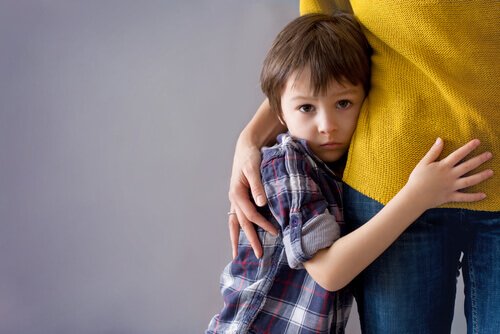Do You Overprotect Your Children?

Do you think you overprotect your children? Surely you’ll say no. That’s because most parents who make this mistake are unaware that they do. The good thing is that there’s a solution. The first step is admitting what you do for the sake of caring for your children.
Recognizing that you overprotect your children isn’t about condemnation or punishing you for not doing better. No one is born with a manual about how to do everything perfectly, especially in regard to the upbringing of children.
However, when your children’s well-being becomes an overwhelming thought, and a constant prevent, prevent, prevent attitude overtakes you, things aren’t as well directed as one might think. So, it’s normal to ask: Where do you draw the line between protecting and overprotecting?
If you overprotect your children, are you a bad parent?
No, you’re not. And, fortunately, there are always opportunities to improve. You just need to find a way to acquire the necessary tools to apply a healthy action plan that will allow you to correct your mistakes.
Although as parents you’re obliged to care for your children, that doesn’t mean you should go overboard. In other words, don’t stop them from living their life.
Many times you forget that not everything in life will be easy. Mistakes are important to the learning process and helping your children overcome said obstacles.

The world is full of dangers and while we must be alert, we shouldn’t isolate our children in a bubble.
You can’t avoid pain and suffering, but you can provide a foundation to help your children avoid problems altogether and also to solve them when they arise. This is about creating a positive attitude.
You must create an environment for your children to grow up safe and sound, an environment where they can talk about what dangers are and how to overcome them.
If you find every single thing a threat and strive to eliminate risks at all costs, you’ll end up exhausted. Not only that, but your children will become insecure as they get older.
With children, fear promotes lack of confidence in themselves and in others. They may not see the opportunities in the challenges that they face. As a result, they make bad decisions and remain in their comfort zone cloaked in security.
The benefit of the mistake
You must respect your right to be wrong. Learning through experience is one of the most enriching lessons for your children.
You must protect your children, provide support at key moments, correct them in their mistakes, and celebrate their successes. You also have to let your children become more exposed to the real world and learn to cope and think for themselves.
The idea is to strengthen their confidence and raise their self-esteem. Be with them without interfering with their decisions. Let them live and, above all, think for themselves. That’s what protection is about: ensuring the welfare of your children without the extreme burden.
Distinguish between the concepts of protecting and overprotecting
Analyze the differences between protecting and overprotecting, and you’ll know if you overprotect your children or not.
Protect
- Accompanying your children in difficult times.
- Helping them have autonomy.
- Educating them to live and to live together.
Overprotect
- Isolating your children. You take them away from any situation that presumes some danger.
- Voiding your children’s personalities. You answer for them and predispose them to certain situations.
- Getting carried away by fear and you stop your children from living their life to the fullest.
Unconditional love has nothing to do with overprotection.

Tips to avoid overprotection
- Avoid demotivating conversations with too many protective messages. For example, telling your children, “You can’t do it. I’ll do it.”
- Let them experiment, materialize their ideas, and make their own decisions. If this leads to failure, instill the importance of learning from those mistakes.
- Walk them through certain household chores or duties. But also allow them to do other tasks on their own without any explanation.
- Affirm responsibility for their actions. Teach them to see their mistakes and apologize when necessary.
- Don’t anticipate them asking for your advice. Your children are capable of solving any problem. If they need help, they’ll ask for it.
Children have to travel down their own paths. As painful as it may be, allow them to do so. Don’t try to live through them. If you think you may be overprotecting your children, now is the time to start fixing the issue.
Do you think you overprotect your children? Surely you’ll say no. That’s because most parents who make this mistake are unaware that they do. The good thing is that there’s a solution. The first step is admitting what you do for the sake of caring for your children.
Recognizing that you overprotect your children isn’t about condemnation or punishing you for not doing better. No one is born with a manual about how to do everything perfectly, especially in regard to the upbringing of children.
However, when your children’s well-being becomes an overwhelming thought, and a constant prevent, prevent, prevent attitude overtakes you, things aren’t as well directed as one might think. So, it’s normal to ask: Where do you draw the line between protecting and overprotecting?
If you overprotect your children, are you a bad parent?
No, you’re not. And, fortunately, there are always opportunities to improve. You just need to find a way to acquire the necessary tools to apply a healthy action plan that will allow you to correct your mistakes.
Although as parents you’re obliged to care for your children, that doesn’t mean you should go overboard. In other words, don’t stop them from living their life.
Many times you forget that not everything in life will be easy. Mistakes are important to the learning process and helping your children overcome said obstacles.

The world is full of dangers and while we must be alert, we shouldn’t isolate our children in a bubble.
You can’t avoid pain and suffering, but you can provide a foundation to help your children avoid problems altogether and also to solve them when they arise. This is about creating a positive attitude.
You must create an environment for your children to grow up safe and sound, an environment where they can talk about what dangers are and how to overcome them.
If you find every single thing a threat and strive to eliminate risks at all costs, you’ll end up exhausted. Not only that, but your children will become insecure as they get older.
With children, fear promotes lack of confidence in themselves and in others. They may not see the opportunities in the challenges that they face. As a result, they make bad decisions and remain in their comfort zone cloaked in security.
The benefit of the mistake
You must respect your right to be wrong. Learning through experience is one of the most enriching lessons for your children.
You must protect your children, provide support at key moments, correct them in their mistakes, and celebrate their successes. You also have to let your children become more exposed to the real world and learn to cope and think for themselves.
The idea is to strengthen their confidence and raise their self-esteem. Be with them without interfering with their decisions. Let them live and, above all, think for themselves. That’s what protection is about: ensuring the welfare of your children without the extreme burden.
Distinguish between the concepts of protecting and overprotecting
Analyze the differences between protecting and overprotecting, and you’ll know if you overprotect your children or not.
Protect
- Accompanying your children in difficult times.
- Helping them have autonomy.
- Educating them to live and to live together.
Overprotect
- Isolating your children. You take them away from any situation that presumes some danger.
- Voiding your children’s personalities. You answer for them and predispose them to certain situations.
- Getting carried away by fear and you stop your children from living their life to the fullest.
Unconditional love has nothing to do with overprotection.

Tips to avoid overprotection
- Avoid demotivating conversations with too many protective messages. For example, telling your children, “You can’t do it. I’ll do it.”
- Let them experiment, materialize their ideas, and make their own decisions. If this leads to failure, instill the importance of learning from those mistakes.
- Walk them through certain household chores or duties. But also allow them to do other tasks on their own without any explanation.
- Affirm responsibility for their actions. Teach them to see their mistakes and apologize when necessary.
- Don’t anticipate them asking for your advice. Your children are capable of solving any problem. If they need help, they’ll ask for it.
Children have to travel down their own paths. As painful as it may be, allow them to do so. Don’t try to live through them. If you think you may be overprotecting your children, now is the time to start fixing the issue.
All cited sources were thoroughly reviewed by our team to ensure their quality, reliability, currency, and validity. The bibliography of this article was considered reliable and of academic or scientific accuracy.
- Mosquera Howard, Y. N., Gutiérrez Esteban, S. P., & Vargas Amézquita, S. L. (2016). Desarrollo social en niños sobreprotegidos (Doctoral dissertation). http://repository.unac.edu.co/handle/11254/224
- Chávez, M. A. (2011). Hijos tiranos o débiles dependientes: el drama del hijo sobreprotegido. Grijalbo.
- Durán, I. G. Hijos sobreprotegidos: el peligro del narcisismo.
- Thomasgard, M., & Metz, W. P. (1993). Parental overprotection revisited. Child Psychiatry and Human Development, 24(2), 67-80. https://link.springer.com/article/10.1007/BF02367260
- Levy, D. M. (1943). Maternal overprotection. https://my.apa.org/apa/idm/login.seam?ERIGHTS_TARGET=http%3A%2F%2Fpsycnet.apa.org%2Frecord%2F1943-04306-000&AUTHENTICATION_REQUIRED=true
This text is provided for informational purposes only and does not replace consultation with a professional. If in doubt, consult your specialist.








